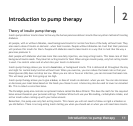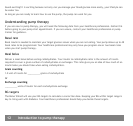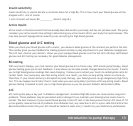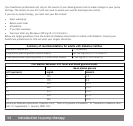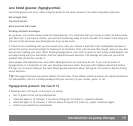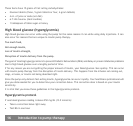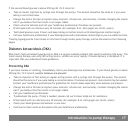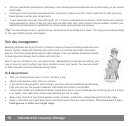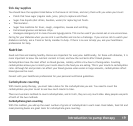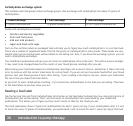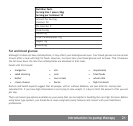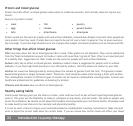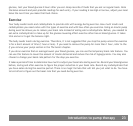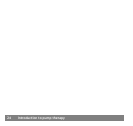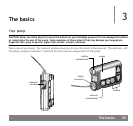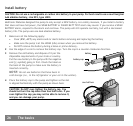
Sick day supplies
You should have the supplies listed below in the house at all times, and carry them with you when you travel:
• Fluids that have sugar (regular soda, juice, jello) to replace solid food.
• Sugar-free liquids (diet drinks, bouillon, water) for replacing lost fluids.
• Thermometer.
• Sugar free medicine for fever, cough, congestion, nausea and vomiting.
• Extra blood glucose and ketone strips.
• Glucagon emergency kit in case of severe hypoglycemia. This can be used if you cannot eat or are unconscious.
Caring for your diabetes when you are sick is worthwhile and can be a challenge. If you are too sick to watch your
diabetes carefully, ask a friend or family member to help. If there is no one to help you, ask your healthcare
professional for help.
Nutrition
Good nutrition and making healthy choices are important for everyone. Additionally, for those with diabetes, it is
more important to know the nutrient content in food, and how the nutrients affect blood glucose.
Carbohydrates have the most effect on blood glucose, notably within a few hours of being eaten. Counting
carbohydrates allows you to match your insulin dose to the food you are eating. This is your insulin to carbohydrate
ratio. Although fat and protein can affect your blood glucose when eaten in large amounts, carbohydrates affect
blood glucose the most.
Consult with your healthcare professional for your personal nutritional guidelines.
Carbohydrate counting
With insulin pump therapy, you must take a bolus for the carbohydrates you eat. You need to count the
carbohydrates you plan to eat to see how much insulin to take.
There are two basic methods to count carbohydrates, and in truth, they are very much alike. Many people use parts
of both of the two methods.
Carbohydrate gram counting
With this method, you add up the exact number of grams of carbohydrate in each meal. Food labels, food list and
meal planning books are great tools for carbohydrate gram counting.
Introduction to pump therapy 19



